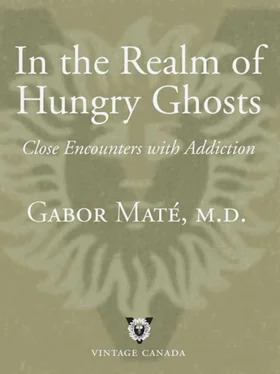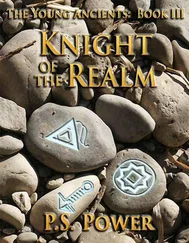The nonprofit Portland Hotel Society, for whom I am the staff physician, turned the building into housing for the nonhousable. My patients are mostly addicts, although some, like Randall, have enough derangement of their brain chemicals to put them out of touch with reality even without the use of drugs. Many, like Arlene, suffer from both mental illness and addiction. The PHS administers several similar facilities within a radius of a few blocks: the Stanley, Washington, Regal and Sunrise hotels. I am the house doctor for them all.
The new Portland faces the Army and Navy department store across the street, where my parents, as new immigrants in the late 1950s, bought most of our clothing. Back then, the Army and Navy was a popular shopping destination for working people—and for middle-class kids looking for funky military coats or sailor jackets. On the sidewalks outside, university students seeking some slumming fun mixed with alcoholics, pickpockets, shoppers and Friday night Bible preachers.
No longer. The crowds stopped coming many years ago. Now these streets and their back alleys serve as the centre of Canada’s drug capital. One block away stood the abandoned Woodward’s department store, its giant, lighted “W” sign on the roof a long-time Vancouver landmark. For a while squatters and antipoverty activists occupied the building, but it has recently been demolished; the site is to be converted into a mix of chic apartments and social housing. The Winter Olympics are coming to Vancouver in 2010 and with it the likelihood of gentrification in this neighbourhood. The process has already begun. There’s a fear that the politicians, eager to impress the world, will try to displace the addict population.
Eva intertwines her arms, stretches them behind her back and leans forward to examine her shadow on the sidewalk. Matthew chuckles at her crackhead yoga routine. Randall rambles on. I glance out eagerly at the rush-hour traffic flowing by. Finally, rescue arrives. My son Daniel drives up and opens the car door. “Sometimes I don’t believe my life,” I tell him, easing into the passenger’s seat. “Sometimes I don’t believe your life either,” he nods. “It can get pretty intense down here.” We pull away. In the rearview mirror the receding figure of Eva gesticulates, legs splayed, head tilted to the side.

The Portland and the other buildings of the Portland Hotel Society represent a pioneering social model. The purpose of the PHS is to provide a system of safety and caring to marginalized and stigmatized people—the ones who are “the insulted and the injured,” to borrow from Dostoevsky. The PHS attempts to rescue such people from what a local poet has called the “streets of displacement and the buildings of exclusion.”
“People just need a space to be,” says Liz Evans, a former community nurse, whose upper-tier social background might seem incongruous with her present role as a founder and director of the PHS. “They need a space where they can exist without being judged and hounded and harassed. These are people who are frequently viewed as liabilities, blamed for crime and social ills, and…seen as a waste of time and energy. They are regarded harshly even by people who make compassion their careers.”
From very modest beginnings in 1991, the Portland Hotel Society has grown to participate in activities such as a neighbourhood bank; an art gallery for Downtown Eastside artists; North America’s first supervised injection site; a community hospital ward, where deep-tissue infections are treated with intravenous antibiotics; a free dental clinic; and the Portland Clinic, where I have worked for the past eight years. The core mandate of the PHS is to provide domiciles for people who would otherwise be homeless.
The statistics are stark. A review done shortly after the Portland was established revealed that among the residents three-quarters had over five addresses in the year before they were housed, and 90 per cent had been charged or convicted of crimes, often many times over, usually for petty theft. Currently 36 per cent are HIV positive or have frank AIDS, and most are addicted to alcohol or other substances—anything from rice wine or mouthwash, cocaine or heroin. Over half have been diagnosed with mental illness. The proportion of Native Canadians among Portland residents is five times their ratio in the general population.
For Liz and the others who developed the PHS, it was endlessly frustrating to watch people go from crisis to crisis, with no consistent support. “The system had abandoned them,” she says, “so we’ve tried to set up the hotels as a base for other services and programs. It took eight years of fundraising and four provincial government ministries and four private foundations to make the new Portland a reality. Now people finally have their own bathrooms, laundry facilities and a decent place to eat food.”
What makes the Portland model unique and controversial among addiction services is the core intention to accept people as they are—no matter how dysfunctional, troubled and troubling they may be. Our clients are not the “deserving poor” they are just poor—undeserving in their own eyes and in those of society. At the Portland Hotel there is no chimera of redemption nor any expectation of socially respectable outcomes, only an unsentimental recognition of the real needs of real human beings in the dingy present, based on a uniformly tragic past. We may (and do) hope that people can be liberated from the demons that haunt them and work to encourage them in that direction, but we don’t fantasize that such psychological exorcism can be forced on anyone. The uncomfortable truth is that most of our clients will remain addicts, on the wrong side of the law as it now stands. Kerstin Stuerzbecher, a former nurse with two liberal arts degrees, is another Portland Society director. “We don’t have all the answers,” she says, “and we cannot necessarily provide the care people may need in order to make dramatic changes in their lives. At the end of the day it’s never up to us—it’s within them or not.”
Residents are offered as much assistance as the Portland’s financially stretched resources permit. Home support staff clean rooms and assist with personal hygiene for the most helpless. Food is prepared and distributed. When possible, patients are accompanied to specialists’ appointments or for X-rays or other medical investigations. Methadone, psychiatric medications and HIV drugs are dispensed by the staff. A laboratory comes to the Portland every few months to screen for HIV and hepatitis and for follow-up blood tests. There is a writing and poetry group, an art group—a quilt based on residents’ drawings hangs on the wall of my office. There are visits from an acupuncturist, hairdressing, movie nights, and while we still had the funds people were taken away from the grimy confines of the Downtown Eastside for an annual camping outing. My son Daniel, a sometime employee at the Portland, has led a monthly music group.
“We had this talent evening at the Portland a few years ago,” says Kerstin, “with the art group and the writing group, and there was also a cabaret show. There was art on the wall and people read their poetry. A long-time resident came up to the microphone. He said he didn’t have a poem to recite or anything else creative…. What he shared was that the Portland was his first home. That this is the only home he’s ever had and how grateful he was for the community he was part of. And how proud he was to be part of it, and he wished his mom and dad could see him now.”
“The only home he’s ever had”—a phrase that sums up the histories of many people in the Downtown Eastside of “one of the world’s most livable cities.” *1
Читать дальше













